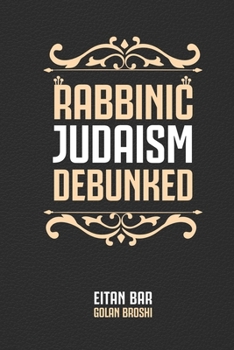Rabbinic Judaism Debunked: Debunking the myth of Rabbinic Oral Law
Select Format
Select Condition 
Book Overview
The central aim of this book is to argue that the God of Israel did not give Moses the traditions of the Orthodox Rabbis, known as the "Oral Law" or "Oral Torah." Jewish tradition claims that the Oral Law, which includes rabbinic laws and statutes, was handed to Moses alongside the Pentateuch. However, drawing from biblical scholarship, history, and archaeology, this book demonstrates that it is unreasonable to believe God gave Moses a concealed Oral Law at Mount Sinai-one that only Rabbis can interpret, thus making the people of Israel dependent on them to connect with God.
This book defines Judaism, explores its origins, and critically examines rabbinic arguments for the Oral Law. It also offers evidence to show that the Oral Law is untenable biblically, historically, and logically while revealing its true sources and intentions based on Jewish scholarly research.
Rabbinic Judaism relies entirely on the claim that God provided an additional, oral body of law. Refuting this claim undermines its foundational premise. As one Jewish professor admitted, "There is no greater threat to Rabbinic Judaism than the refutation of the Oral Law as handed down to Moses at Sinai."
We wish to clarify three key points:
First, this book explores challenging issues but is fully supported by academic research. Drawing on studies from Israeli scholars, it presents rigorous arguments while remaining accessible to non-academic readers.
Second, we deeply respect the Jewish people (of which we are a part) and their dedication to preserving God's Word and identity throughout the diaspora. However, we lament that traditions rooted in the Oral Law have led to a version of Judaism that diverges from the Hebrew Bible and the God of Israel.
Third, this critique is an internal discussion between Jews who believe in Yeshua (Jesus) and those who do not. It is not an attack on the Jewish people but a call for dialogue grounded in biblical and historical truth.
Dr. Eitan Bar (1984) is an uprising Jewish-Christian scholar and thinker with several advanced Bible and theology degrees living in Israel. His unique combination of Jewish background and Christian education and faith offers a fresh view of various spiritual doctrines. As a native Hebrew speaker and a Bible scholar, he combines his Jewish heritage with his Christian education and faith to offer new and timely perspectives on Christianity. Dr. Golan Broshi was born and raised in a Kibbutz by the Galilee in Israel. He holds a Dual Bachelor's degree in Education and in Social and Anthropology; a Master's degree in Jewish Education; and a Doctorate (D.Min) degree in Middle Eastern studies.













